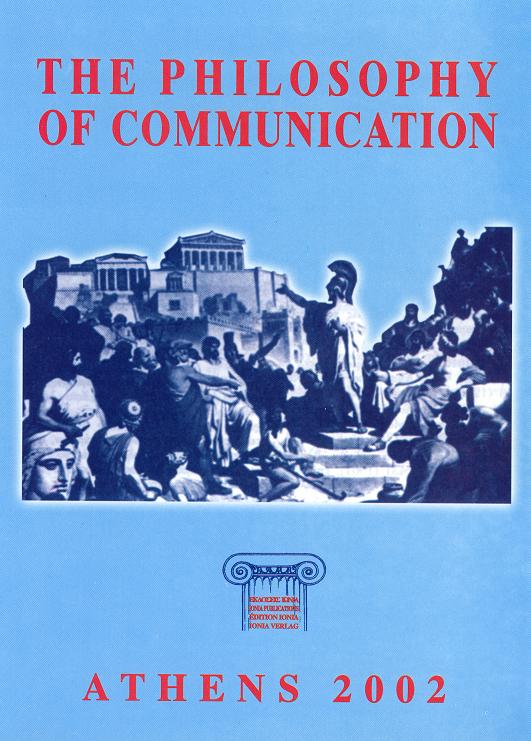Konstantine Boudouris and John Poulakos, eds., The Philosophy of Communication, Volume I, Ionia Publications, Athens, 2002, pp.215, ISBN: 960-7670-38-8
The papers included in the present volume are an attempt to inquire into the Greek philosophy of communication. Prompted by such contemporary phenomena as the explosion of technological advances in mass communication or the pervasive uses of the computer and the Internet, the authors here represented have turned to our Hellenic heritage for ideas that can help us make sense of the ways in which we communicate today.
Although each essay differs from the rest in approach, purpose and scope, they all converge on the notion that the problems of communication since antiquity remain fundamentally the same. Accordingly, they all address the same three units of analysis that Greek thinkers addressed many centuries ago: the logos, the speaker, and the listener(s). At the same time, they all gesture, some more explicitly than others, toward the formal character of dialogue and rhetoric, the two modes of communication that occupy center stage in ancient Greek thought.
The main frame of the Hellenic philosophy of communication was formally developed in the fourth century BCE, and more details were added later on. However, the practices and intellectual currents that stimulated such a development go as far back as Homer, the Pre-socratics, and the Sophists.
The value of these papers is best appreciated when read in conjunction with those contained in the Second Volume of the Philosophy of Communication (Athens 2002).

VOLUME 1 CONTENTS
- 1. EDITORS' INTRODUCTION
- 2. EUGENE V. AFONASIN
- DISCOURSE AND DIALOGUE: QUESTIONS TO BE SETTLED BEFORE THE STUDY OF THE LITERATURE OF A TRANSITION PERIOD
- 3. ALASTAIR BEATTIE
- ACCESSING THE NOUS
- 4. BETH S. BENNETT
- ETHICAL CHALLENGES FOR ARISTOTLE'S RHETORIC IN AN AGE OF MEDIATED COMMUNICATION
- 5. FRANCISCO J. GONALEZ
- CONVERSING ABOUT VIRTUE EVERY: SOCRATIC COMMUNICATION AS END, NOT MEANS
- 6. RICHARD HARTNETT
-
- KAIROS AND BIAN: COMPARATIVE CONCEPTUALIZATION OF RHETORIC IN CLASSICAL GREECE AND CHINA.
- 7. DAVID HITCHCOCK
- ARISTOTLE'S THEORY OF ARGUMENT EVALUATION
- 8. DAVID C. HOFFMAN
- LOGOS AND PLURALISM: THE FOUNDATION OF THE SOPHISTIC MOVEMENT
- 9. KOSTAS KALIMTZIS
- PHANTASIA IN DECEPTIVE AFFECTIVE COMMUNICATION
- 10. MARI LEE MIFSUD
- PHILOSOPHY, RHETORIC AND EROS IN THE COMING OF SELF KNOWLEDGE
- 11. IGOR NEVVAJAI
- THE PRINCIPLE OF COMMUNICATION IN THE CONTEXT OF FOUNDATIONALISM AND RELATIVISM
- 12. JOHANI PIETARINEN
- ETHICAL ASPECTS OF COMMUNICATION IN THE CONTEXT OF FOUNDATIONALISM AND RELATIVISM
- 13. TAKIS POULAKOS
- THE RHETORIC OF PRAISE AND THE CONSTITUTION OF IDENTITY
- 14. JEREMIAH REEDY
- INTERCULTURAL COMMUNICATIONS IN ANTIQUITY
- 15. HAROLD TARRANT
-
- PROCLUS ON HOW PLATO COMMUNICATES
- 16. STEPHANIE THEODOROU
- THE EPISTEMOLOGICAL FOUNDATION OF COMMUNICATION IN ARISTOTLE'S POETICS AND DE INTERPRETATIONE. A CONTEMPORARY RAPROCHEMENT WITH PAUL RICOEUR
- 17. HIDEYA YAMAKAWA
- THE INCOMMENSURABILITY OF PHILOSOPHICAL COMMUNICATION IN PLATO'S LAWS
- 18. LISA WILKINSON
- PARMENIDES' FRAGMENTED TRUTH: PUTTING THE PIECES BACK TOGETHER
- 19. JUDY WUBNIG
- WHAT DOES MENO KNOW: MENO'S QUESTION AND HIS BAD MEMORY IN PLATO'S MENO
- 20. INDEX NOMINUM

